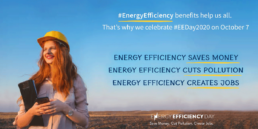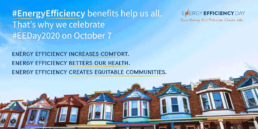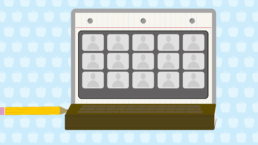October 7 is Energy Efficiency Day

Some people might say energy conservation is a big problem best handled by government and industry. While this can certainly a significant part of the solution, there are many things that we can do now as individuals to create positive change by incorporating energy conserving practices in our homes or offices!
Why not celebrate Energy Efficiency Day by taking actions that all of us can do? You can make a difference today by starting new habits and traditions which are both good for the planet and good for your financial wellbeing. Here are some suggestions that benefit everyone:
- Use what you need and unplug the rest! Every electrical item doesn’t need to be always on or plugged in. Adopt a use when needed approach.
-
- Turn off lights when not necessary
- Unplug electrical items that are not used regularly
-
- Run the dishwasher and laundry machines during off-peak hours to reduce your utility bills and take a load off your power grid
- Install energy conserving devices such as thermostats, LED lights, timers, etc., to match peak and off-peak usage levels
- Choose Energy Star Appliances and Equipment
- Take a walk or ride a bike more often and drive less
- Take the stairs instead of an elevator or escalator
- Consider solar panels for electricity, heat, and hot water to reduce power grid usage.
- Install water-saving plumbing fixtures, toilets, shower valves, shower heads which ultimately reduces energy consumption.
Energy efficiency is not only good for the world and good business, and it’s great for your wallet too! Save the world and save money by conserving energy today. Happy Energy Efficiency Day!
For more energy saving tips please visit the official Energy Efficiency Day website.
Ed Tepper is the Chief Operating Officer and Chief Finance Officer at CoPeace. As a forward-thinking holding company, CoPeace is building a portfolio of carefully selected for-profit companies with measurable social and environmental impact. To learn more about impact investing, check out CoPeace’s Intro to Impact Investing.
A Commitment to Sacred Spaces: Celebrating National Public Lands Day
2020 is a year for the record books — and if climate change wasn’t top of mind for you last year, it’s hard to ignore this year. Our forests are burning, oceans are churning, and the effects of climate change are undeniable. There’s never been a more obvious time to commit to protecting and preserving the sacred spaces on our beautiful planet… we should all be on a quest to make sure the fires and hurricanes don’t win. Combating climate change is a foundational value for us at CoPeace.
Of the many ways we can each take part to be the change we want to see in the world, celebrating National Public Lands Day — which was last weekend — is at the top of our list. National Public Lands Day is the largest single-day volunteer effort to celebrate the connection between people and green space. It’s a day to get out and make a difference, however — and wherever — you can.
The History of National Public Lands Day
In 1994, three federal agencies and over 700 volunteers launched the first National Public Lands Day. It’s grown substantially over the last few decades. Each year, hundreds of thousands of volunteers participate in land clean-up events, tree planting events, seed collection, wild animal habitat improvements, and more. There’s a tradition on National Public Lands Day to encourage people to visit parks and green space all over the country — it’s a fee-free day at many federally managed parks and natural areas.
2020 Theme: “More Ways to Connect to Nature.”
This year things look a little different (or let’s face it… a lot different) in terms of getting out and about and involved in group activities. So if you didn’t get out in the fresh air to enjoy our beautiful lands, we understand. Due to social distancing guidelines and various local regulations that prevent large gatherings and volunteer events, National Public Lands Day hosted a series of virtual events this year. The virtual events allowed people to connect to iconic parks, national forests, marine estuaries, and various other land sites via the internet. Just like everyone’s doing this year — we’re finding new ways to support causes we care about here at CoPeace. We’re deeply committed to environmental stewardship and protecting our planet, and climate crisis solutions is at the top of our list of priorities. We want to do everything in our power to preserve our planet for future generations. That’s why we’ve invested in our holdings, Uncharted Power and AST. Uncharted Power is working on data infrastructure technology to provide universal access to clean, reliable, affordable power. AST is a new-generation waste management solution using plasma technology that is environmentally-friendly, safe, and financially viable.
We’re committed to positive change and protecting our planet, not just on National Public Lands Day, but also every day.
Lindsay Hope is a copywriter and marketing strategist with CoPeace. As a forward-thinking holding company, CoPeace is building a portfolio of carefully selected for-profit companies with measurable social and environmental impact. To learn more about impact investing, check out CoPeace’s Intro to Impact Investing.
“Basic” Education

After changing from my sleep pants to my “work” sweatpants, and right before jumping on the first of what seems like an endless array of video meetings, I had some time to reflect on our recent household “emergency.” My daughter’s computer charger has stopped working.
I’ll spare you the boring details, but it took two very stressful days of watching the battery percentage helplessly drop before we were able to get a new charger. This was an emergency, since my daughter, like a large portion of the children around the world, is going to school remotely and a working computer is required for school education…a computer! Let that sink in.
School supplies used to be a notebook, a pencil, and a book (and an optional Transformers lunch box …if you were cool).
Through this pandemic we have seen a great push for social equality. It has been a problem for so many years and education sits right smack in its center of the issue. The access and quality of education are just a few of the issues that widen the divide in our society. Internet connectivity, a computer, and even electricity are luxuries a lot of us take for granted, and we only see their true value when they are suddenly gone. If you have kids, just trying shutting off your WiFi for five minutes and see your sweet child instantaneously morph into The Incredible Hulk!
As we try and plan for a better future on the other side, we cannot ignore the lessons we learn during the pandemic. We now know what the future will look like, we now know what the future will require from our children to be successful. So that is where we should invest our money.
We should invest in a future where each child has what they need to succeed. This way we not only become a more fair and just society, but we also become a more successful and prosperous society, where bright minds have the right platform to excel and ideas can flourish. This is not only the right thing to do socially, but the right thing to do financially!
At CoPeace we believe in investing in companies who create those platforms and the type of impact that changes generations. We do so, not by being psychic or pretending we know more than anyone else, but by taking note of the world around us and the direction it is heading toward.
Hanan Levin is a Senior Investment Advisor at CoPeace. As a forward-thinking holding company, CoPeace is building a portfolio of carefully selected for-profit companies with measurable social and environmental impact. To learn more about impact investing, check out CoPeace’s Intro to Impact Investing.
What National Water Quality Month Means To Us

“Aappovaa Annam Shariram Annadam”
This Sanskrit verse implies that water (Aappovaa) is the basis for food, and the human body (shariram) is composed (survived) of food (annadam). Hence, it is utmost essential to save water.
August is National Water Quality Month. This reminds us to think of how valuable the water resources are like oceans, lakes, and rivers to preserve, which provide clean and safe water to us. Safe, clean, potable water should be a right for everyone, but it’s becoming a privilege nowadays. Many countries around the world are grappling with the issue of providing clean water.
In under-developed countries or developing countries, getting drinkable water to everyone is becoming more of a challenge to poor and lower-income families.
As a developing country, India is on the brink of a water crisis. Poor management of water resources and water pollution are the main reasons for this crisis. Many rivers flow throughout the country. So, they are the main sources for drinking water and household chores. But they are polluted regularly. The situation gets worse when people wash their clothes and bathe in river water.
On my last trip to India, I saw how lower-income groups of people have to struggle to get clean drinking water. People living in rural areas have to walk miles every day to get a few gallons of potable water for their families. Additionally, the majority of the population in India does not get access to clean tap water. During the monsoon months, most people who have access to clean tap water, will still boil the water before drinking.
Most of the middle-income and upper-income families use their own reverse-osmosis filters to treat tap water when it is available, but in most cities, it is supplied for just a few hours each day. Corporations supply drinking water in trucks to lower-income families who boil it to make it fit to drink.
This is not just India; access to clean water does not exist in many communities throughout the world. Unfortunately, having high quality, unpolluted water is continuously taken for granted, especially by developed countries. In the US, we use water for everything from drinking to recreation without thinking twice about it, but what most Americans don’t realize is, not all water is created equal, and having immediate access to clean water is a privilege, not a right.
How do we prevent harming the water quality?
It is important to only flush the three Ps (pee, poop and [toilet]paper). Flushing other items could contaminate the wastewater system, causing downstream water quality issues, or it could create major plumbing issues, including broken pipes.
Here are a few things we can do to prevent water pollution:
-
- Make sure to dispose of any paint, pesticides, cleaners, chemicals, and other items at your local hazardous waste site.
- Some landscaping pesticides and fertilizers are harmful to the water supply. When choosing your landscaping products, it is important to choose phosphorus-free products. It is also important not to overwater your lawn, since that can cause runoff of fertilizers and pesticides into the water supply.
- Clean any oil leaks or spills with either kitty litter or baking soda, then dispose of that in the trash.
- Dispose of pet waste as soon as possible.
- Keep your gutters and sidewalks clean, so debris does not get washed into the storm drain.
- Sweep paved areas around your house, rather than hosing them down.
You never know the worth of water until the well runs dry, so Conserve water, Conserve life.
Aarti Karnik is the Director of Web Development with CoPeace. As a forward-thinking holding company, CoPeace is building a portfolio of carefully selected for-profit companies with measurable social and environmental impact. To learn more about impact investing, check out CoPeace’s Intro to Impact Investing.





